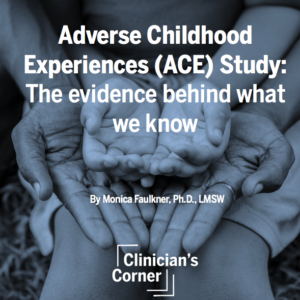Adverse Childhood Experiences (ACE) Study: The evidence behind what we know
Want to discuss this article more on Facebook Live? Vote for it above! 
By Monica Faulkner, LMSW, Ph.D.
Important to know:
- In the late 1990s, researchers collected data from 17,000 Kaiser Permanente HMO patients. They linked childhood experiences of trauma and instability to adult health problems such as cancer and heart disease.
- Adverse Childhood Experiences (ACEs) include child abuse (emotional, physical and/or sexual abuse); household challenges (family violence, substance use, mental illness, divorce and/or incarceration of a family member); and neglect (emotional and/ or physical).
- A higher ACE score correlates with later negative health outcomes, including early death, for some.
The fact that trauma impacts motivation and behavior is not new or surprising to clinicians. Most of us know when there is something deeper driving a client’s behaviors even when it is not articulated. Today, the knowledge clinicians have carried for decades about trauma has emerged in discussions in public health, medicine and education in the forms of trauma-informed practices and research on childhood trauma, toxic stress and ACEs. The impetus for these discussions lies with a study that, like our knowledge base, is not new.
In the late 1990s, researchers at the Center for Disease Control and Kaiser Permanente in Southern California[1] were able to provide very compelling evidence that childhood trauma and instability impact health outcomes. They surveyed 17,000 primarily white, middle-class adults. Each person indicated whether any of the ten adverse experiences occurred in his or her childhood. Over half of the people surveyed identified at least one of the negative experiences. A quarter of individuals reported experiencing two or more. The more adverse experiences a person reported, the more likely that person was to experience a host of serious illnesses as an adult.
The 10 Adverse Childhood Experiences
| 1. | Emotional abuse |
| 2. | Physical abuse |
| 3. | Sexual abuse |
| 4. | Mother treated violently |
| 5. | Substance abuse in the home |
| 6. | Mental illness of a family member |
| 7. | Parents divorced/separated |
| 8. | Family member incarcerated |
| 9. | Emotional neglect |
| 10. | Physical neglect |
The ACEs study continues to draw attention because of the high prevalence of adverse experiences. There are interesting caveats often discussed amongst those interested in the study. First, the study was conducted with a privileged population (white, middle-class individuals who had health insurance). The fact that ACEs occurred at such a high rate suggests that more disenfranchised populations will have higher ACEs scores. Second, the list of ACEs is not by any means, an exhaustive list. We know children in war zones, natural disasters, households with food instability and many other adverse experiences will have long-term health outcomes.
Two other strands of research have encouraged the discussion of ACEs. Along with the ACE studies in the 1990s, there is a continued focus in public health on social determinants of health[2]. In other words, a person’s social and physical environments affect health just as biology does. While the field of social work and other helping professions have longed utilized the systems/ecological perspective to help clients, the concept of looking beyond biological causes for illness is innovative in the health field and it is an opportunity to bridge clinician’s knowledge with other professions. The second strand of research comes from the medical field, which has provided evidence that trauma impacts, our physical bodies. For instance, we know that trauma impacts brain development.[3] Additional information is emerging that suggests that our exposure to traumatic events alters our DNA.[4]
The new attention and commitment to understanding and addressing ACEs comes from a greater awareness provided by research in multiple fields. ACEs, trauma and toxic stress are important to understand as potential driving factors behind client behaviors. However, more important to understand is that none of these things determines outcomes. While some clients may be at higher risk for negative outcomes, building resilience should remain at the core of any intervention.
[1] Perry, B.D. Maltreatment and the developing child: How early childhood experience shapes child and culture. The Inaugural Margaret McCain lecture (abstracted); McCain Lecture series, The Centre for Children and Families in the Justice System, London, ON, 2005
[2] https://www.theguardian.com/science/2015/aug/21/study-of-holocaust-survivors-finds-trauma-passed-on-to-childrens-genes
[3] http://www.ajpmonline.org/article/S0749-3797(98)00017-8/abstract
[4] https://www.healthypeople.gov/2020/topics-objectives/topic/social-determinants-of-health
More Articles in This Issue:
How to Create Trauma-informed Systems of Care within Organizations
Social Workers Can Collaborate with Physicians to Create Aces-informed Healthcare
How to Administer a Trauma Screening Using The ACEs Questionnaire
ACE’s in Foster Care: Rethinking Trauma Informed Care
